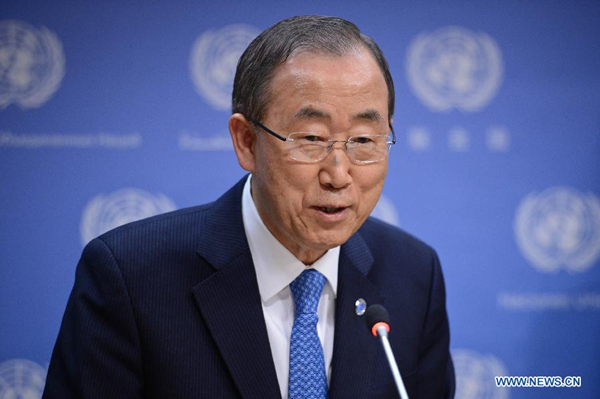UN hails new report on curbing carbon emissions
 0 Comment(s)
0 Comment(s) Print
Print E-mail China.org.cn, July 9, 2014
E-mail China.org.cn, July 9, 2014
Secretary-General Ban Ki-moon, introducing a new United Nations-backed report outlining pathways major industrial economies can use to cut their carbon emissions by mid-century, called on Tuesday for broad cooperation and "bold" action or the world will face dangerous and irreversible climate disruption.
 |
|
United Nations Secretary-General Ban Ki-moon speaks during a press conference on the Deep Decarbonization Pathway Project (DDPP) interim report , at the UN headquarters in New York, on July 8, 2014. [Photo/Xinhua] |
"We know that we are not on track, and time is not on our side," Mr. Ban warned during a Headquarters press conference to launch the "Deep Decarbonization Pathway Project (DDPP)" report, produced by leading research institutes in 15 countries, is the first global cooperative program to identify practical pathways to a low-carbon economy by 2050.
The report compiled by the Sustainable Development Solutions Network, established by the UN chief in 2012, emphasizes three key pillars: energy efficiency, low-carbon electricity and fuel switching. It also outlines steps countries can take to meet internationally agreed target of limiting the increase in global mean surface temperature to less than 2 degrees Celsius.
"I expect countries to adopt different combinations according to their needs, resources and priorities. But all countries need to embark on the same journey," said the Secretary-General, stressing that deep decarbonisation is feasible, but requires global commitment to advancing key low-carbon energy technologies.
He highlighted the importance of leaders from Governments, business, finance and civil society to come together at his climate summit in September and the Conference of Parties to the UN Framework Convention on Climate Change held three months later in Lima, Peru.
"By seeing what is possible, others can take inspiration and follow suit," he said, adding that, media participation in getting the word out is critical, as is conducting workshops and roundtables around the world following the climate summit to foster discussions in every city and country.
"People need to understand why decarbonisation is necessary. They need to know it is possible. And they need to see that cutting emissions can benefit economics and people's well-being," he said.
The Project does exactly that by listening to feedback and continuing to refine its pathways, Mr. Ban said, calling it exactly the kind of problem-solving needed to tackle climate change and achieve sustainable development.
Also speaking at the press conference was Jeffrey Sachs, the Director of the Earth Institute at Columbia University and Laurence Tubiana, the French Ambassador for climate change.
Mr. Sachs said the report shows there is a path to climate safety and keeping global warming below 2 degrees Celsius limit "which researchers and scientists say we must respect." What is concerning about the report is that "we are way off track and to get on track would require major cooperative efforts that are not currently in place," he continued.
A "business as usual" path would be "an absolutely reckless and unforgivable gamble" to the planet and all people, he said. While there is an overarching responsibility for UN Member States, what each country will choose to do is different and based on history, structure, political attitudes and resources.
Ms. Tubiana called the report a "transformational milestone" for coordinated global action. "No country can afford to diverge," she said, stressing the need for international cooperation, policy, economic signals, and sharing technology and research.
Cities must be organized to respond, she continued, emphasizing the need for a viable balance between energy conservation and energy efficiency. It would also be important to compare national progress between countries, as this will help them better understand relative experiences.






Go to Forum >>0 Comment(s)